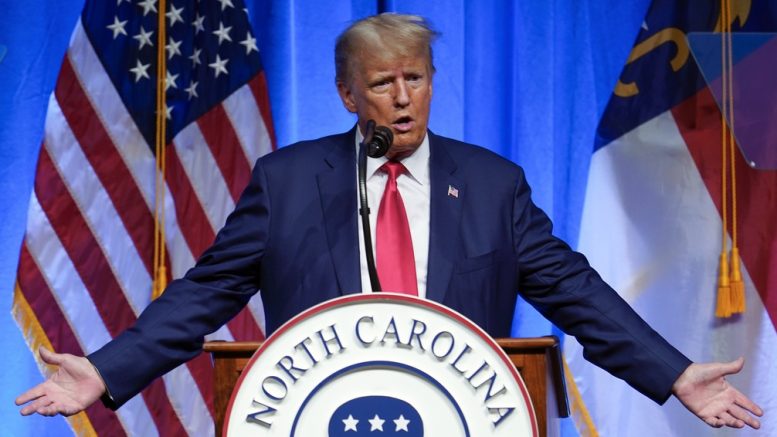WASHINGTON (AP) — Donald Trump and his allies are escalating efforts to undermine the criminal case against him and drum up protests as the former president braces for a history-making federal court appearance this week on dozens of felony charges accusing him of illegally hoarding classified information.
Trump’s Tuesday afternoon appearance in Miami will mark his second time in as many months facing a judge on criminal charges. But unlike a New York case some legal analysts derided as relatively trivial, the Justice Department’s first prosecution of a former president concerns conduct that prosecutors say jeopardized national security and that involves Espionage Act charges carrying the threat of a significant prison sentence in the event of conviction.
Ahead of his arraignment, Trump ratcheted up the rhetoric against the Justice Department special counsel who filed the case, calling Jack Smith “deranged” and his team of prosecutors “thugs” as he repeated without any evidence his claims that he was the target of a political persecution.
He called on his supporters to join a planned protest at the Miami courthouse Tuesday, where he will be arraigned on the charges.
“We need strength in our country now,” Trump said, speaking to his longtime friend and adviser Roger Stone in an interview on WABC Radio. “And they have to go out and they have to protest peacefully. They have to go out.”
“Look, our country has to protest. We have plenty of protest to protest. We’ve lost everything,” he went on.
He also said there were no circumstances “whatsoever” under which he would leave the 2024 race, where he’s so far been dominating the Republican primary.
Other Trump supporters have rallied to his defense with similar language, including Kari Lake, the unsuccessful Republican gubernatorial candidate in Arizona who pointedly said over the weekend that if prosecutors “want to get to President Trump,” they’re ”going to have to go through me, and 75 million Americans just like me. And most of us are card-carrying members of the NRA.”
Trump’s calls for protest echoed exhortations he made ahead of a New York court appearance last April, where he faces charges arising from hush money payments made during his 2016 presidential campaign, though he complained that those who showed up to protest then were “so far away that nobody knew about ’em,” And just like in that case, he plans to address supporters in a Tuesday evening speech hours after his court date.
Trump is expected to depart for Miami on Monday and will spend the rest of the day in Florida, huddled with advisers. After his court appearance, he will return to New Jersey, where he’s scheduled a press event to publicly respond to the charges.
Trump supporters were also planning to load buses to head to Miami from other parts of Florida, raising concerns for law enforcement officials who are preparing for the potential of unrest around the courthouse. Mayor Francis Suarez was expected to announce additional details Monday about the preparations though there was little police presence near the courthouse as late as Sunday afternoon and barricades hadn’t yet been erected nearby, a stark contrast to New York City where police planned for protests for weeks even though no violence ultimately happened.
The Justice Department unsealed Friday an indictment charging Trump with 37 felony counts, 31 relating to the willful retention of national defense information. Other charges include conspiracy to commit obstruction and false statements.
The indictment alleges Trump intentionally retained hundreds of classified documents that he took with him from the White House to his Florida estate, Mar-a-Lago, after leaving the White House in January 2021. The material he stored, including in a bathroom, ballroom, bedroom and shower, included material on nuclear programs, defense and weapons capabilities of the U.S. and foreign governments and a Pentagon “attack plan,” the indictment says. The information, if exposed, could have put at risk members of the military, confidential human sources and intelligence collection methods, prosecutors said.
Beyond that, prosecutors say, he sought to obstruct government efforts to recover the documents, including by directing personal aide Walt Nauta — who was charged alongside Trump — to move boxes to conceal them and also suggesting to his own lawyer that he hide or destroy documents sought by a Justice Department subpoena.
Some fellow Republicans have sought to press the case that Trump is being treated unfairly, citing the Justice Department’s decision in 2016 to not charge Democrat Hillary Clinton for her handling of classified information through a private email server she relied on as secretary of state. But those arguments overlook that FBI investigators did not find any evidence that Clinton or her aides had willfully broken laws regarding classified information or had obstructed the investigation.
New Hampshire Republican Gov. Chris Sununu, speaking Sunday on CBS News, said there was a “huge difference” between the two investigations but that it “has to be explained to the American people.”
The Justice Department earlier this month informed former Vice President Mike Pence that it would not bring charges over the presence of classified documents in his Indiana home. A separate Justice Department special counsel investigation into the discovery of classified records at a home and office of President Joe Biden continues, though as in the Clinton case, no evidence of obstruction or intentional law-breaking has surfaced.
Trump’s own former attorney general, William Barr, offered a grim prediction of Trump’s fate, saying on Fox News that Trump had no right to hold onto such sensitive records.
“If even half of it is true,” Barr said of the allegations in the indictment, “then he’s toast. I mean, it’s a pretty — it’s a very detailed indictment, and it’s very, very damning. And this idea of presenting Trump as a victim here — a victim of a witch hunt is ridiculous.”







































